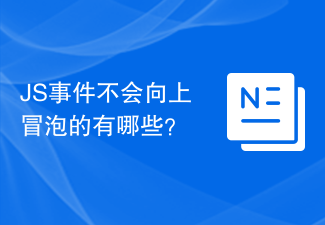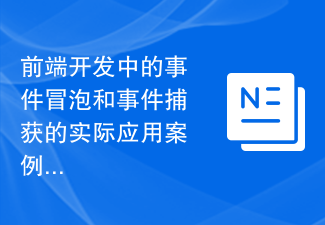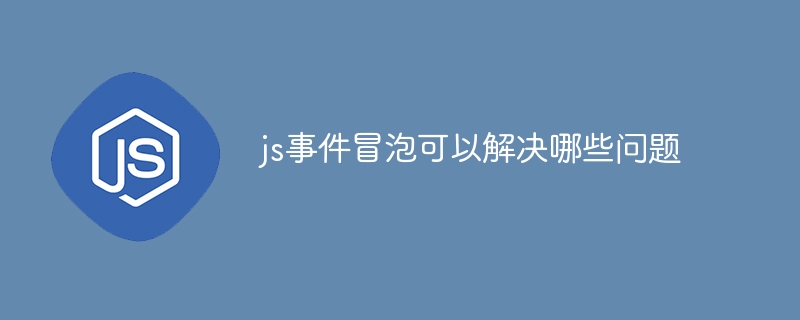
What are the commonly used commands to prevent bubbling events?
In web development, we often encounter situations where we need to handle event bubbling. When an event is triggered on an element, such as a click event, its parent element will also trigger the same event. This behavior of event delivery is called event bubbling. Sometimes, we want to prevent an event from bubbling up, so that the event only fires on the current element, and prevents it from being passed to superior elements. To achieve this, we can use some common directives that prevent bubbling events.
- event.stopPropagation()
This is one of the most common and simplest ways to stop bubbling. When an event is triggered, calling the stopPropagation() method can prevent the event from continuing to propagate. This method can only prevent the event from bubbling, but cannot prevent the event's default behavior. - event.stopImmediatePropagation()
Similar to stopPropagation(), the stopImmediatePropagation() method can also prevent events from bubbling, but its function is more powerful. Not only does it prevent the event from bubbling up, it also prevents subsequent event handlers from being called. If you have multiple event handlers on the same element and want to execute only one of them, you can use the stopImmediatePropagation() method. - event.cancelBubble
This is a compatibility method commonly used in older versions of IE browsers. Setting event.cancelBubble to true prevents events from bubbling. - return false
In JavaScript, an easy way is to use return false in an event handler. Its function is equivalent to calling event.stopPropagation() and event.preventDefault() at the same time, which not only prevents the event from bubbling, but also prevents the default behavior of the event. But it should be noted that if return false is used elsewhere, such as in a normal function, it will only prevent the default behavior and will not affect event bubbling.
Although the above methods can prevent events from bubbling, in actual development, we should use them with caution. Excessive use of methods that prevent event bubbling may lead to poor readability of the code and make event handling overly complex. When writing code, you should try to take into account the overall logic of event propagation and avoid over-reliance on methods that prevent bubbling.
The above is the detailed content of What are the common ways to prevent bubbling events?. For more information, please follow other related articles on the PHP Chinese website!
 了解事件冒泡机制:为何子元素的点击会影响父元素的事件?Jan 13, 2024 pm 02:55 PM
了解事件冒泡机制:为何子元素的点击会影响父元素的事件?Jan 13, 2024 pm 02:55 PM理解事件冒泡:为什么子元素的点击会触发父元素的事件?事件冒泡是指在一个嵌套的元素结构中,当子元素触发某个事件时,该事件会像冒泡一样逐层传递到父元素,直至最外层的父元素。这种机制使得子元素的事件可以在整个元素树中传递,并依次触发所有相关的元素。为了更好地理解事件冒泡,让我们来看一个具体的示例代码。HTML代码:
 什么是单击事件冒泡Nov 01, 2023 pm 05:26 PM
什么是单击事件冒泡Nov 01, 2023 pm 05:26 PM单击事件冒泡是指在网页开发中,当某个元素被单击时,该单击事件不仅会在被点击的元素上触发,还会逐层向上触发,直到到达根元素为止。单击事件冒泡机制可以简化事件的绑定数量,实现事件委托,处理动态元素,切换样式等,提高代码的可维护性和性能。在使用单击事件冒泡时,需要注意阻止事件冒泡、事件穿透以及事件绑定的顺序等问题,以确保单击事件的正常触发和处理。
 JS事件不会向上冒泡的有哪些?Feb 18, 2024 pm 06:31 PM
JS事件不会向上冒泡的有哪些?Feb 18, 2024 pm 06:31 PM不会冒泡的JS事件有哪些?JavaScript是一种强大的脚本语言,它为网页增加了交互性和动态性。在JavaScript中,事件驱动编程是非常重要的一部分。事件是指用户在网页上进行的各种操作,比如点击按钮、鼠标移动、键盘输入等等。JavaScript通过事件处理函数来响应这些事件,并进行相应的操作。在事件处理过程中,事件冒泡是一种常见的机制。事件冒泡是指当一
 冒泡事件的常见阻止方法有哪些?Feb 19, 2024 pm 10:25 PM
冒泡事件的常见阻止方法有哪些?Feb 19, 2024 pm 10:25 PM常用的阻止冒泡事件指令有哪些?在Web开发中,我们经常会遇到需要处理事件冒泡的情况。当一个元素上触发了某个事件,比如点击事件,它的父级元素也会触发相同的事件。这种事件传递的行为称为事件冒泡。有时候,我们希望阻止事件冒泡,使事件只在当前元素上触发,并阻止其向上级元素传递。为了实现这个目的,我们可以使用一些常见的阻止冒泡事件的指令。event.stopPropa
 前端开发中的事件冒泡和事件捕获的实际应用案例Jan 13, 2024 pm 01:06 PM
前端开发中的事件冒泡和事件捕获的实际应用案例Jan 13, 2024 pm 01:06 PM事件冒泡与事件捕获在前端开发中的应用案例事件冒泡和事件捕获是前端开发中经常用到的两种事件传递机制。通过了解和应用这两种机制,我们能够更加灵活地处理页面中的交互行为,提高用户体验。本文将介绍事件冒泡和事件捕获的概念,并结合具体的代码示例,展示它们在前端开发中的应用案例。一、事件冒泡和事件捕获的概念事件冒泡(EventBubbling)事件冒泡是指在触发一个元
 防止事件冒泡的实际技巧和案例研究Jan 13, 2024 pm 03:28 PM
防止事件冒泡的实际技巧和案例研究Jan 13, 2024 pm 03:28 PM阻止事件冒泡的实用技巧与案例分析事件冒泡是指在DOM树中,当一个元素触发了某个事件,该事件会一直向上冒泡至DOM树中的父元素,直到根节点。这种冒泡机制有时会导致一些意想不到的问题和错误。为了避免这种问题的发生,我们需要学会使用一些实用的技巧来阻止事件冒泡。本文将介绍一些常用的阻止事件冒泡的技巧,并结合案例进行分析,并提供具体的代码示例。一、使用事件对象的st
 什么是事件冒泡事件捕获Nov 21, 2023 pm 02:10 PM
什么是事件冒泡事件捕获Nov 21, 2023 pm 02:10 PM事件冒泡和事件捕获是指在HTML DOM中处理事件时,事件传播的两种不同方式。详细介绍:1、事件冒泡是指当一个元素触发了某个事件,该事件将从最内层的元素开始传播到最外层的元素。也就是说,事件首先在触发元素上触发,然后逐级向上冒泡,直到达到根元素;2、事件捕获则是相反的过程,事件从根元素开始,逐级向下捕获,直到达到触发事件的元素。
 js事件冒泡可以解决哪些问题Dec 15, 2023 pm 03:46 PM
js事件冒泡可以解决哪些问题Dec 15, 2023 pm 03:46 PMjs事件冒泡可以解决的问题:1、简化事件处理逻辑;2、提高事件处理性能;3、实现自定义组件和交互效果;4、控制事件传播方向;5、解决事件覆盖问题;6、实现全局事件监听;7、方便调试和排查问题。详细介绍:1、简化事件处理逻辑,在复杂的Web应用程序中,往往需要对大量元素进行事件处理,如果对每个元素都单独绑定事件处理函数,代码会变得冗余且难以维护;2、提高事件处理性能等等。


Hot AI Tools

Undresser.AI Undress
AI-powered app for creating realistic nude photos

AI Clothes Remover
Online AI tool for removing clothes from photos.

Undress AI Tool
Undress images for free

Clothoff.io
AI clothes remover

AI Hentai Generator
Generate AI Hentai for free.

Hot Article

Hot Tools

Dreamweaver Mac version
Visual web development tools

MantisBT
Mantis is an easy-to-deploy web-based defect tracking tool designed to aid in product defect tracking. It requires PHP, MySQL and a web server. Check out our demo and hosting services.

PhpStorm Mac version
The latest (2018.2.1) professional PHP integrated development tool

SublimeText3 Chinese version
Chinese version, very easy to use

mPDF
mPDF is a PHP library that can generate PDF files from UTF-8 encoded HTML. The original author, Ian Back, wrote mPDF to output PDF files "on the fly" from his website and handle different languages. It is slower than original scripts like HTML2FPDF and produces larger files when using Unicode fonts, but supports CSS styles etc. and has a lot of enhancements. Supports almost all languages, including RTL (Arabic and Hebrew) and CJK (Chinese, Japanese and Korean). Supports nested block-level elements (such as P, DIV),






